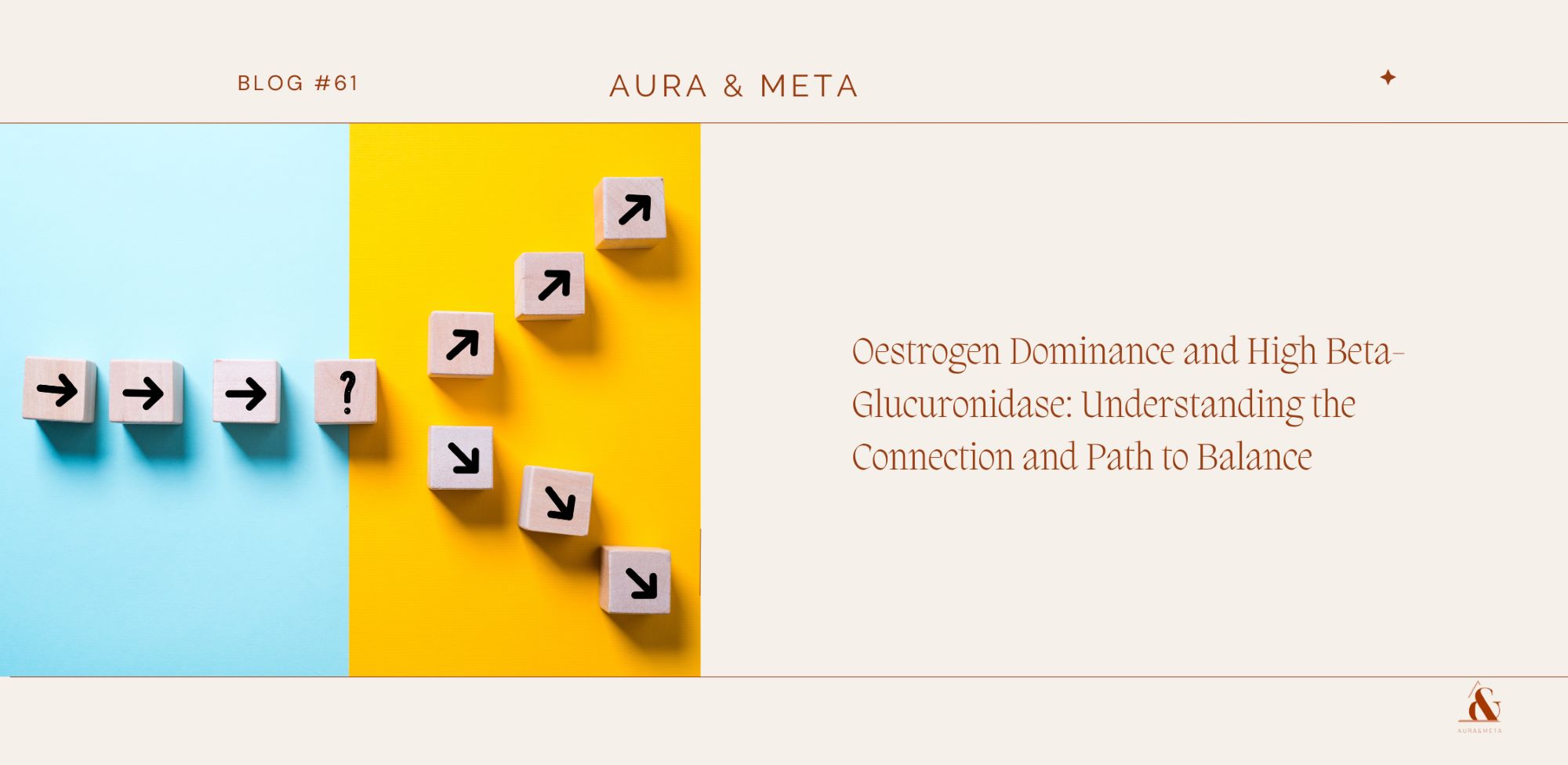Oestrogen dominance, a condition where oestrogen levels are too high relative to other hormones, has been associated with a range of health concerns, including weight gain, mood swings, and increased PMS symptoms. One significant yet often overlooked contributor to oestrogen dominance is an enzyme called beta-glucuronidase. By understanding the relationship between oestrogen dominance and high beta-glucuronidase, we can begin to see why hormone balance is essential for well-being, especially in women.
At Aura & Meta, we take a holistic approach to hormone balance, combining traditional knowledge with targeted testing to uncover root imbalances and help women regain their vitality.
What Is Oestrogen Dominance?
Oestrogen dominance occurs when oestrogen levels are elevated relative to other hormones, particularly progesterone. This imbalance can arise due to lifestyle factors, diet, stress, and environmental toxins. Oestrogen dominance can affect many aspects of health, contributing to symptoms such as:
- Mood swings
- Weight gain, especially around the abdomen
- Irregular menstrual cycles
- Increased PMS symptoms
- Fatigue and lack of energy
Addressing oestrogen dominance often involves nutritional therapy, lifestyle adjustments, and understanding the underlying metabolic pathways that influence oestrogen balance.
Understanding Beta-Glucuronidase and Its Role in Oestrogen Metabolism
Beta-glucuronidase is an enzyme produced in the gut by certain bacteria, and it plays a critical role in oestrogen metabolism. When oestrogen is processed in the liver, it binds with glucuronic acid to be excreted via bile into the intestines. However, high levels of beta-glucuronidase can “unpack” oestrogen from this bound state, allowing it to re-enter the bloodstream, leading to an accumulation of oestrogen.
This reabsorption process can contribute to oestrogen dominance, creating a cycle of hormonal imbalance. Testing for beta-glucuronidase levels, which can be done through specific functional tests like the DUTCH test, helps in understanding whether this enzyme might be contributing to oestrogen re-circulation.
Factors Contributing to Elevated Beta-Glucuronidase Levels
High beta-glucuronidase levels are often linked to gut dysbiosis, which is an imbalance in the gut microbiota. Factors that can elevate beta-glucuronidase levels include:
- Poor Diet: Diets high in refined sugars, processed foods, and low in fiber can foster an imbalance in gut bacteria.
- Chronic Stress: Stress affects the gut-brain axis, which in turn can impact gut flora and enzyme levels.
- Environmental Toxins: Exposure to endocrine disruptors, found in plastics and certain cosmetics, can influence hormone metabolism.
- Genetics: Some individuals are genetically predisposed to higher beta-glucuronidase activity. Genetic testing can provide insights into individual predispositions and support personalized care.
Symptoms of Oestrogen Dominance and High Beta-Glucuronidase
The symptoms associated with oestrogen dominance and high beta-glucuronidase often overlap and can impact daily life. Common symptoms include:
Bloating and Digestive Issues: High beta-glucuronidase levels can disrupt digestion and contribute to bloating.
Mood Imbalances: Oestrogen affects neurotransmitters like serotonin, which impacts mood regulation.
Weight Gain: Excess oestrogen can contribute to weight gain, especially in the abdomen.
Fatigue: Hormone imbalances, particularly those involving oestrogen, can contribute to persistent fatigue.
For a comprehensive look at hormone-related symptoms, Aura & Meta offers Women’s Hormone Testing to help identify areas of imbalance and guide personalized care.
How to Manage Oestrogen Dominance and High Beta-Glucuronidase
1. Nutrition for Gut Health
Supporting a balanced gut microbiome can reduce beta-glucuronidase activity. Consider the following dietary changes:
- Increase Fiber Intake: Fiber helps bind excess oestrogen in the intestines and promotes its excretion. Foods rich in fiber include vegetables, whole grains, legumes, and seeds.
- Probiotics and Prebiotics: Incorporating probiotic-rich foods like yogurt, kefir, and sauerkraut helps maintain healthy gut flora. Prebiotics from foods like garlic, onions, and bananas nourish beneficial bacteria.
Visit our nutritional therapy page to explore personalized dietary support that can aid in hormone balance.
2. Detoxification and Liver Support
The liver plays a key role in processing and detoxifying oestrogen. Supporting liver health can help prevent the buildup of excess oestrogen:
- Antioxidants and Detoxifying Foods: Foods like broccoli, Brussels sprouts, and green tea are rich in antioxidants and support liver health.
- Hydration: Drinking enough water aids in detoxification, helping the body flush out excess hormones.
Our functional approach to wellness emphasizes the importance of liver health in hormone balance.
3. Reducing Environmental Toxin Exposure
Endocrine-disrupting chemicals found in everyday products can affect hormone levels. Reducing exposure to these chemicals can support hormone balance:
- Choose Clean Cosmetics: Opt for products free of parabens and phthalates.
- Limit Plastic Use: Use glass or stainless-steel containers for food and beverages to reduce exposure to hormone-disrupting chemicals in plastics.
4. Stress Management Techniques
Stress increases cortisol, which can impact oestrogen metabolism. Engaging in stress-reduction practices helps maintain hormone balance. Consider mindfulness practices, yoga, or seeking support through kinesiology approaches for a balanced body-mind connection.
5. Functional Testing for Personalized Insight
Testing provides a deeper understanding of your body’s unique hormonal needs. The DUTCH Test is particularly useful in assessing oestrogen levels and their metabolic pathways, including beta-glucuronidase activity. For a comprehensive analysis, consider Women’s Well Essential DNA Package, to understand your genetic imprint around hormones.
Embracing Balance Through Personalized Care
Addressing oestrogen dominance and managing beta-glucuronidase levels is essential for women’s health and well-being. Understanding and working with the body’s natural detoxification processes, promoting a balanced gut microbiome, and supporting liver health are all fundamental steps toward achieving hormonal balance.
If you’re experiencing symptoms associated with oestrogen dominance, consider booking a consultation at Aura & Meta to explore personalized strategies. We can work together to tailor a plan that supports your body’s natural ability to regulate hormones, so you can feel balanced, energized, and in control of your health.

